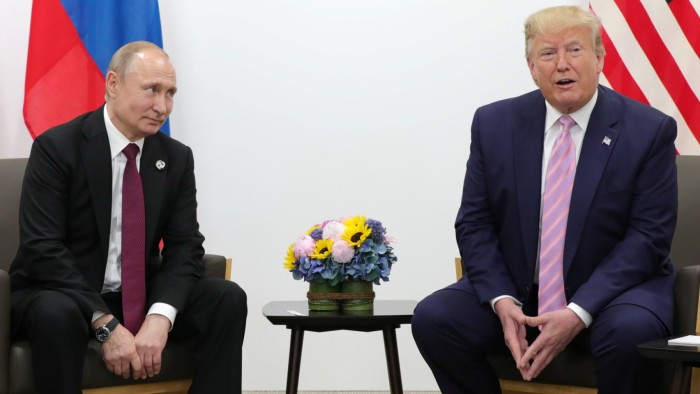Unlock the White House Watch newsletter for free
Your guide to what the 2024 US election means for Washington and the world
The writer is director of the Carnegie Russia Eurasia Center in Berlin
When Vladimir Putin ordered the full-scale invasion of Ukraine three years ago, it was a watershed moment akin to that of 9/11. Russia’s assault on its neighbour, though rooted in the country’s piecemeal journey into the darkness, was not inevitable. Once it happened, however, the war changed the course of history. The perfect storm of challenges facing western leaders is unprecedented in living memory, and managing the relationship with a rogue Russia is one of the most consequential.
Now entering its fourth year, the war has devastated Ukraine, the main victim of unnecessary horror unleashed by the Kremlin. Russia is a distant second, but nevertheless the war is a strategic disaster for it, too — particularly if measured against all the peaceful alternative trajectories the country could have taken. The sad irony is that by invading Ukraine, Putin has created long-term security challenges for Russia that didn’t exist before. Three years ago, it was hardly conceivable that western missiles would be fired at military targets inside Russia with near impunity, that a non-nuclear country would occupy a chunk of Russian territory, that Finland and Sweden would join Nato, and that Moscow’s much-prized special relationship with Germany would be ruined. Yet all of that has come to pass. What’s more, Putin has turned Ukrainians into an aggrieved nation armed to the teeth and looking for ways to settle scores for atrocities committed by those who used to call them “brothers”.
Russia has indeed suffered “a strategic defeat,” as then US secretary of state Antony Blinken said in March 2022 as the offensive against Kyiv collapsed, humiliating Russia. But fast forward to 2025, and the picture is far worse than the triumphalist expectations many in the west preached to their publics and to Ukrainians. Russia has absorbed the setbacks and, notwithstanding soaring casualties and destroyed equipment, is pushing against the battered Ukrainian military. Moreover, the Kremlin has embarked on military reconstitution. By 2030, its war machine is likely to be bigger and better.
Faced with a tsunami of western sanctions, the Russian economy was expected to be in tatters long ago. But unlike the USSR, it runs on market principles and is managed by able technocrats. The country is also an important exporter of oil and other commodities that are difficult to fully cut off without disrupting global markets. This, as well as self-interested support from China and other non-western countries, explains both the gradualism in sanctions as well as Russia’s resilience. Finally, Russian society — atomised even before the war — has been cowed by repression, and the similarly atomised elites have rallied around Putin.
Then, in the most surprising plot twist, Putin got lucky with the election in the US of Donald Trump, who seeks to end the war and curtail American involvement. The war has been on a negative trajectory for some time — at least since Ukraine’s botched 2023 counteroffensive. But the election of Trump makes the problem much worse. The Kremlin hopes that since he is looking for a quick deal, it can also be a dirty deal that will simply cease hostilities but leave Ukraine with no credible security guarantees and set it on a path of implosion — including through polarising presidential elections.
Whatever the unpredictable outcome of Trump’s diplomatic cavalry charge, one thing is clear: even if the guns in Ukraine fall silent, and even if Trump lifts US sanctions against Russia, the current regime in the Kremlin will continue to view the west as a mortal enemy. Putin’s triumphalism, vengefulness and desire to make a mark on Russian history, along with the glaring lack of checks and balances in the Kremlin, will prompt Moscow to start preparing for the next war while stepping up its intimidation campaign against Europe.
Three years ago, western capitals believed that Kyiv would fall in a matter of days. A combination of Ukrainian courage and ingenuity, Russian sloppiness, and western support averted that scenario. Ukraine is still standing, Europe has painfully reduced its dependency on Russian raw materials and investments in deterrence have been made. But by other metrics, the situation for Europeans is worse than in early 2022. Progress in upgrading the defence industrial base remains patchy. The difficult post-Covid recovery was derailed in many countries by the impact of the war, making increased defence spending a hard sell for voters. Most importantly, instead of its traditional role as the bedrock of European security, the US under Trump is itself a source of risk. To top it all, unity inside the EU and within larger countries is more fractured. Even if competent road maps such as the Draghi report are drawn up to address these problems, will there be the political will to follow them?
One problem that the west can and should address is its wishful thinking about shortcuts to defeat Putin and manage the Russia challenge. Unrealistic expectations of an outright victory, rooted in a glaring lack of clear-eyed perspective, have been part of the problem all along. It’s time to have a quiet, sober-minded conversation about how to mitigate the threats that will emanate from Russia in the coming decade, and how to prepare for what might come next.
Read the full article here




